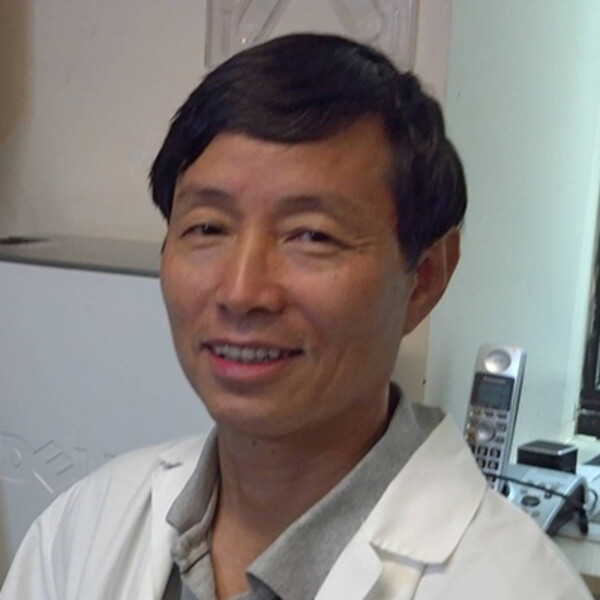Main Second Level Navigation
Jim Hu
PhD

Dr. Jim Hu is presently a Senior Scientist in the Physiology & Experimental Medicine Program at the Research Institute at The Hospital for Sick Children (SickKids). He is also a Professor in the Departments of Laboratory Medicine and Pathobiology and Paediatrics, and is a member of the Graduate Faculty of the Institute of Medical Science, University of Toronto. He is currently a member of the University of Toronto Graduate Education Council (2014-2017).
Dr. Hu received his PhD in Biology from Harvard University (Cambridge, MA, USA). His PhD studies on RNA polymerase and gene transcription were carried out under the supervision of Dr. Lawrence Bogorad in the Department of Cellular and Developmental Biology. After graduating, Dr. Hu came to SickKids for his postdoctoral training in RNA splicing with Dr. James D. Friesen in the Department of Genetics.
Dr. Hu serves as a member of the American Society of Gene Therapy Genetic Diseases Committee (2007-2010), and a member of the Medical/Scientific Advisory Committee of the Canadian Cystic Fibrosis Foundation and Chair of its Research Subcommittee (2006-2009). He has served as a panel member for the CIHR Respiratory Committee and for the Canadian Lung Association several times. He also served as a grant panel member for the National Science Foundation of China several times.
Research Synopsis
Dr. Jim Hu's major research goal is to develop novel gene delivery strategies in order to translate the genetic discoveries into clinical applications. His team developed novel viral vectors that can protect CF mice from acute lung bacterial infection and established methods for efficient airway gene delivery to large animals. His current endeavour is to achieve permanent airway gene correction by targeting the airway stem cells.
The Hu laboratory is located on the 9th floor of the Peter Gilgan Centre for Research and Learning (PGCRL) in the Hospital for Sick Children. The laboratory is equipped for conducting a full range of experiments from molecular analysis to animal studies. In addition, the hospital Research Institute has several core facilities, such as an animal facility, as well as facilities for flow cytometry, imaging, microarray, and mass spectrometry.
Development of gene therapy for airway genetic diseases
Current molecular biology and genetic technologies give us unprecedented means to identify the genetic mutations that cause diseases, to develop diagnostic methods, and to understand disease mechanisms. Research advancements have also enhanced the development of gene-based therapies for genetic lung diseases, such as cystic fibrosis (CF).
Gene therapy works by replacing a gene carrying a disease-causing mutation with a healthy, functioning copy of the gene. Gene therapy has several advantages over conventional drug treatments or surgery; most importantly, it fixes the cause of a disease, not just the symptoms.
Gene therapy is designed as a non-invasive treatment for infrequent use, thus reducing the drug and treatment burden on patients and improving their quality of life. Ultimately, gene therapy treatments will also be more cost-effective, reducing the financial burden on our healthcare system. Moreover, some drugs are only effective for certain gene mutations. By using a gene therapy approach, a single treatment would be able to help all patients with different mutations in the same disease-associated gene.
My group has previously demonstrated that genes can be efficiently delivered to the lungs of mice, rabbits, and pigs. These technological advancements create a unique opportunity to treat lung genetic diseases like CF, by replacing disease-associated genes in the lung stem cells, which we are now directly targeting for long-term therapeutic gene expression. Discoveries made from our research will represent a major step forward in efficiently and cost-effectively treating patients with genetic diseases of the lung.
Airway gene regulation
Many respiratory diseases, such as cystic fibrosis and asthma, involve pathological changes in lung epithelial cells. Therefore, understanding gene regulation in the lung epithelial cells has important health implications.
We have been working on a set of epithelium-specific Ets-like transcription factor genes, ESE-1, ESE-2 and ESE-3, where the expression of ESE-1, in particular, is highly induced under inflammatory conditions. Using a knockout mouse model, we have shown that this gene is involved in regulating airway immune responses. We are currently elucidating its role in regulation of inflammation in other human diseases, such as sepsis and rheumatoid arthritis.
